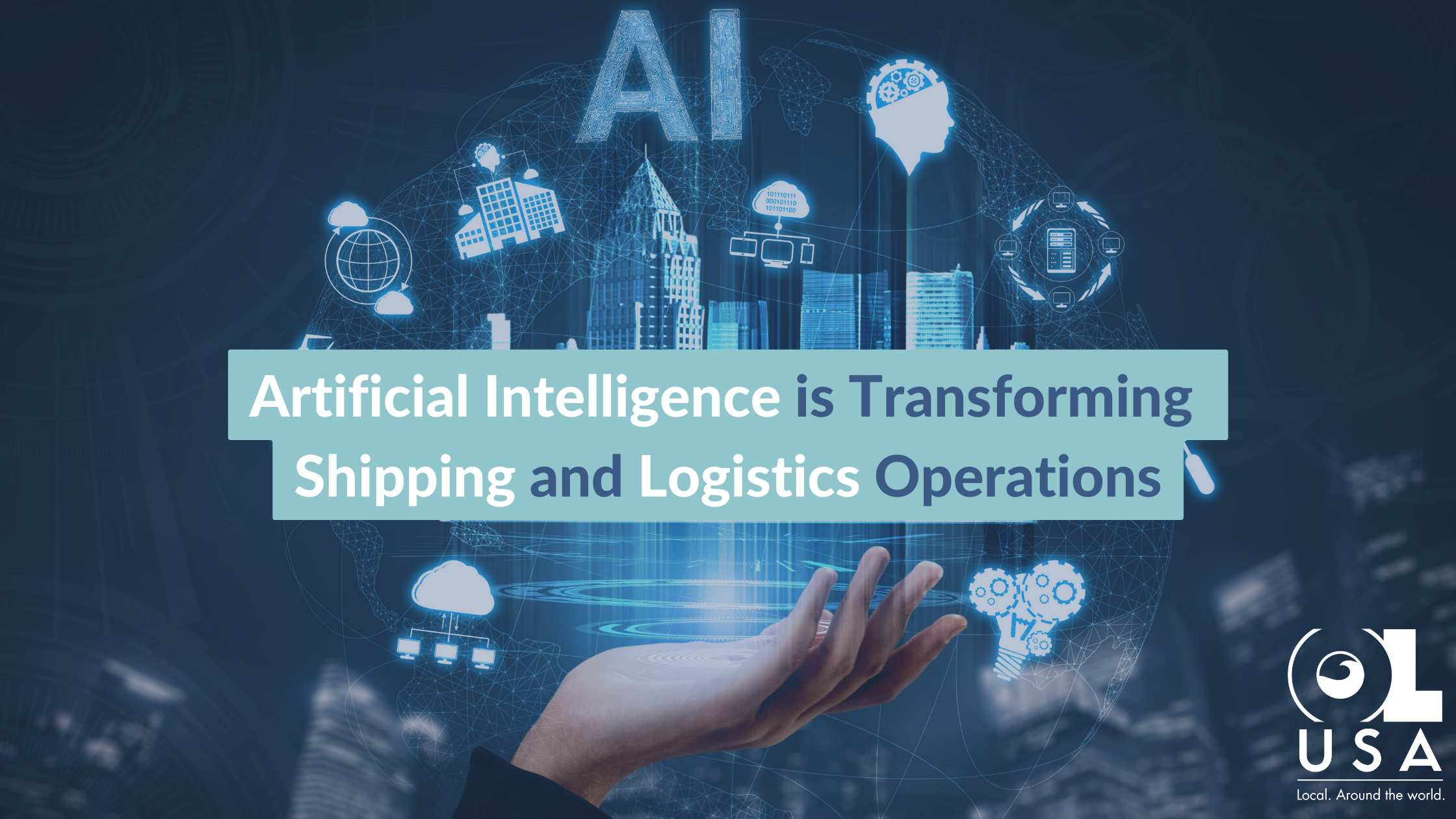When we think of artificial intelligence, our minds often conjure up images of futuristic robots or complex algorithms. However, AI is more than just a sci-fi concept; it has rapidly made its way into various industries, revolutionizing the way we work. One area it’s making significant waves in is shipping and logistics. Let’s explore the role of AI in transforming the shipping and logistics industry, and how it is reshaping the way goods are transported across the globe.
1. Streamlining Supply Chain Management
Effective supply chain management is crucial for successful logistics operations. With AI-powered systems, supply chain management has reached new levels of efficiency and optimization. AI can rapidly (in some cases, nearly instantaneously) analyze data from multiple sources to make data-driven decisions concerning procurement, inventory management, and demand forecasting. They identify cost-effective suppliers by analyzing supplier data, market trends, and pricing.
Automating procurement through AI speeds up decision-making. A good system optimizes inventory levels by predicting future demand using historical sales data and market trends—accurately. It also identifies slow-moving or obsolete inventory. Accurate forecasting helps companies adjust production levels and reduce lead times.
AI also minimizes errors in manual tasks like data entry, analysis, and decision-making, improving efficiency and customer satisfaction. These systems provide real-time insights into the supply chain, allowing companies to track shipments, monitor inventory, and identify bottlenecks. By addressing issues promptly—in some cases, before they even materialize—companies optimize operations and enhance customer satisfaction. That means lower operating costs, shorter lead times, and appropriate inventory management.
2. Enhancing Route Optimization
Route optimization is crucial in shipping and logistics, and AI algorithms have absolutely revolutionized this process. By analyzing real-time data, including traffic conditions, weather forecasts, and historical transportation data, a good AI system calculates efficient routes for shipments. It considers factors like fuel consumption, delivery time, and vehicle capacity, adapting to changing conditions and providing alternative routes to avoid delays.
The advantages of AI-powered route optimization are tremendous. It reduces costs by identifying efficient routes, minimizing fuel consumption, and optimizing stops and deliveries. This not only saves money, but also improves productivity by reducing idle time. Moreover, AI contributes to environmental sustainability by minimizing unnecessary mileage, helping carriers better align their operations with global sustainability efforts.
But arguably the greatest benefit is its scalability, as AI can handle complex supply chains regardless of size or complexity. It can process large amounts of data quickly and accurately, enabling logistics providers to make informed decisions about the best routes. Further integration with technologies like GPS tracking and IoT sensors also provide real-time updates and insights, allowing for monitoring and timely notifications about potential bottlenecks or delays. In short, AI helps carriers and logistics providers determine the best routes at a virtually limitless scale, cutting costs and keeping operations running as smoothly as possible.
3. Predictive Maintenance
Effective maintenance is a critical component of ensuring the seamless functioning of logistics operations. With the integration of AI systems empowered by machine learning algorithms, companies can achieve higher levels of accuracy in monitoring equipment and predicting maintenance needs. By thoroughly analyzing sensor data collected from various sources, such as temperature, vibration, or pressure sensors, these AI systems can detect potential failures or malfunctions, providing opportunities for proactive maintenance instead of reactive maintenance. Who doesn’t want to fix something before it breaks?
By accurately forecasting maintenance requirements based on data patterns, companies can schedule maintenance tasks more efficiently, minimizing downtime and preventing unexpected breakdowns. This saves valuable time and dramatically reduces the financial burden of costly repairs. The ability to anticipate maintenance needs allows logistics operations to operate much more reliably, ensuring smooth operations and minimizing disruptions that can negatively impact customer satisfaction.
Moreover, AI-powered maintenance systems provide valuable insights and recommendations for optimizing maintenance practices. By analyzing historical maintenance data and equipment performance, AI can identify patterns and correlations that may go unnoticed by human analysts. These insights can be used to improve maintenance schedules, identify areas for enhancement, and even inform equipment design and performance improvements. AI allows logistics operations the opportunity to fine-tune their maintenance practices, leading to more efficient and effective operations.
4. Improved Customer Experience
In today’s customer-centric era, the use of AI technology holds immense potential for elevating satisfaction levels in the shipping and logistics industry. Even something as simple as AI-powered chatbots and virtual assistants allow companies to significantly improve customer experience.
AI-powered chatbots and virtual assistants serve as efficient and reliable customer service representatives, and are capable of handling a wide range of inquiries and real-time support. These intelligent systems are equipped with natural language processing capabilities, letting them understand and respond to customer queries accurately and promptly. Customers can receive instant responses, eliminating the frustration of waiting for human assistance during peak periods or after business hours.
While AI isn’t perfect, these systems are surprisingly versatile in terms of handling day-to-day customer interactions. Out of the box, most of them can answer frequently asked questions about shipping, delivery times, tracking numbers, and pricing information. Not only that, these chatbots can track shipments in real-time, providing customers with accurate updates on the status and location of their packages. By automating these routine tasks, AI frees up human customer service representatives to focus on more complex issues, providing personalized assistance and resolving intricate problems that require human expertise.
Primarily, AI significantly improves response times, ensuring that customers receive prompt and timely support. This speed of service creates a positive impression and enhances overall customer satisfaction. Many can also provide more personalized interactions, if they are provided customer data and purchase history. They can tailor recommendations, suggest complementary products or services, and provide targeted assistance based on individual preferences, fostering a sense of personalized care and attention.
It’s important to note that these service systems also continuously improve through machine learning algorithms. As they interact with customers and receive feedback, they can refine their responses and recommendations, becoming even more accurate and effective over time. This iterative learning process ensures that the AI systems continuously adapt to customer preferences and evolving needs, delivering an enhanced customer experience with each interaction.
The Verdict
The integration of AI into shipping and logistics operations is transforming the industry in profound ways. From streamlining supply chain management to optimizing routes, from predictive maintenance to chatbots, and from enhancing customer experience to reducing costs, AI is revolutionizing every aspect of the logistics process. Embracing AI technology enables companies to operate more efficiently, make informed decisions, and stay ahead of the competition. As we continue to witness advancements in AI, we can expect even more exciting possibilities in the future, paving the way for an intelligent and interconnected logistics ecosystem.



